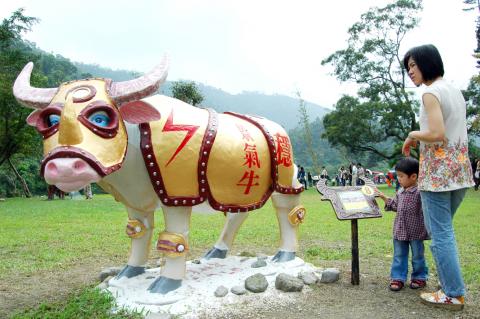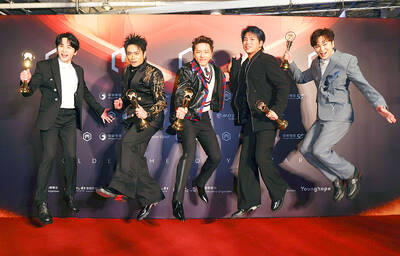覆水難收 (fu4 shui3 nan2 shou1)
傳說中國商末時有一位官員名為姜尚,因為不滿商紂王的殘暴統治棄官而走,與妻子住在陝西渭水河邊一個偏僻的地方。然而姜尚天天就只是坐在河邊裝模作樣地釣魚,等人來雇用他。一段時間後,家裡的生計發生了問題,他的太太無可奈何下決定離開他。
有一天,出外狩獵的周文王巧遇坐在河邊假裝釣魚的姜尚,便與他攀談,論及兵法及策略,最後邀他協助攻滅商朝。商朝滅後,姜尚封王在齊。姜尚的太太看姜尚有錢又有地位,就請求與他恢復夫妻關係。姜尚取來了一壺水,傾倒在地,叫她把水收回壺中。意思是,如果倒在地上的水無法收回,那已經分裂的夫妻關係也同樣無法覆合。換言之,「若言離更合,覆水定難收。」

Photo: CNA
照片: 中央社
有些傷人的話一旦說了,就覆水難收,事後再怎麼道歉,都沒用了。
(Sometimes harmful words cannot be retracted, it doesn’t matter how many times you apologize.)
離婚手續都辦好了,他的心也碎了,覆水難收,現在後悔也來不及了。
(The divorce is through, he feels terrible, but it’s too late for regrets now.)
It’s no use crying over spilled milk
This is similar in meaning and usage to the proverb 覆水難收, which literally means, “spilled water is difficult to retrieve.” Both entail liquid having been spilled; both allude to the impossibility of returning them, entirely and uncontaminated, into their original state. They refer to the fact that the damage has been done, and that the best option is simply just to move on.
The Chinese proverb talks about how the wife of a statesman in ancient China left him when he fell on hard times, and how she wanted to come back when he regained position and wealth. His response was to throw water onto the floor and say that their returning to their previous relationship was as likely as her being able to return all of the water to the jar.
The two are slightly different, however. The Chinese proverb emphasizes the idea that there is no turning back; the English idiom emphasizes the idea that there is no point getting upset about things that have already happened if you have no control over them.
I’ve torn my shirt. No point crying over spilled milk, I’ll just buy another.
我的襯衫已經破了,覆水難收,也只能買件新的了。
Why cry over spilled milk? Pick yourself up and start again.
別浪費時間後悔了,振作起來重新出發吧。

Have you ever wondered why “Manila envelopes” carry that name? The answer lies in a plant native to the Philippines. Though a fruit-producing plant, abaca is most valued for its leaf stalks, which are __1__ to extract fibers known as “Manila hemp.” These fibers are known for their strength and resistance to saltwater. Because of its __2__ in sea environments, Manila hemp has long been used to make Manila rope, a staple in the sailing and maritime industries for centuries. It withstands harsh ocean conditions without its flexibility being __3__. Manila rope doesn’t break down easily when exposed to

A: In addition to boyband Energy’s concerts, Taiwan’s first major male dance revue has attracted attention. B: Several South Korean male dance revues and Australia’s Thunder from Down Under often tour Taiwan. Now Taiwan’s first all-male revue has finally appeared. A: According to the Liberty Times, Muscle High: A Male Dance Revue from Taiwan, featuring 13 hunks, opened last month and will run until Sept. 14. B: The rise of “hunk fever” in recent years has even caused a trend of working out in Asia. A: Let’s go to the Taipei Music Center’s Sub Livehouse for the show. A:

A: Any fun events happening this weekend? B: Boyband Energy’s concerts and Taiwan’s first major male dance revue have both sparked anticipation recently. A: Energy staged a comeback last year — 15 years after they disbanded — and they’re now more popular than ever. B: Their megahit “Friday Night” even won Song of the Year at the Golden Melody Awards. A: To pay tribute to the Queen of Pop Madonna, they added her choreography of 16 continuous jump squats to their music video, prompting a “16-squat challenge” that went viral across Taiwan. Do you wanna try it out? A:

In a major step to combat carbon emissions, Norway’s pioneering “Northern Lights project” is set to expand its carbon capture and storage (CCS) capabilities. Backed by energy giants and the Norwegian government, this collaborative project is working to increase its annual carbon storage capacity from 1.5 million to over five million tons. Northern Lights focuses on capturing CO2 emissions from industrial sources across Europe and securely storing them underground. Captured CO2 will be liquefied and transported by ship to the storage facility located off the coast of Norway. It will be injected through pipes into geological formations about 2,600m below the